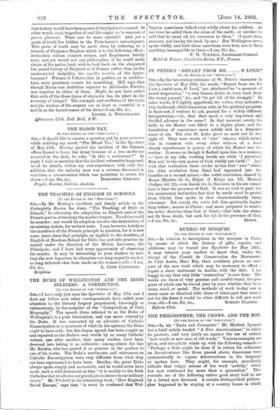ST. PETER'S "DEPART FROM ME 0 LORD."
rTO THE EDITOR OF THE "SPECTATOR."1 Sin,=-In the interesting estimate of St. Peter's character in the Spectator of May 10th, his words, "Depart from me, for I am a sinful man, 0 Lord," are attributed to "a moment of moral desperation," "a very human desire to turn back from the weary pursuit," &c., and "to get 'rid of the struggle." In other words, if I rightly apprehend the writer, they indicate a step backward, albeit temporary only, in his spiritual progress. Is there not, I venture to ask, ground for a widely different interpretation,—viz., that they mark a very important and decided advance in the same ? In that moment, surely, his faith in his Master was lifted to a higher plane, and the foundation of repentance more solidly laid in a deepened sense of sin. The clue St. Luke gives us must not be lost sight of. They were words of "awe" (ilit,e,see) which struel. him in common with every other witness of a work clearly superhuman in power, of which his Master was tlw worker. It seems as though it flashed upon him in a moment —" here at my side, working beside me while 'I perceived Him not,' is the very power of God, visibly put forth !" And with that realisation there awoke in him that " awe" which the older revelation from Sinai had ingrained into the Israelite as a second nature,—the awful conviction, shared by Moses (Exodus iii. 6), Elijah (1 Kings xix. 13), Manoah (Judges xiii. 22), even Isaiah (vi. 5), that man in his sin cannot face or bear the presence of God. It was no wish to part, but the momentary instinctive fear that he needs must be parted from Christ, that spoke in that characteristically hasty utterance. Yet surely the crisis left him spiritually higher than before; nearer to Christ ; and More prepared to receive the better doctrine than that of Sinai,—that bids the sinner not fly from death, but seek for life in the presence of God.










































 Previous page
Previous page